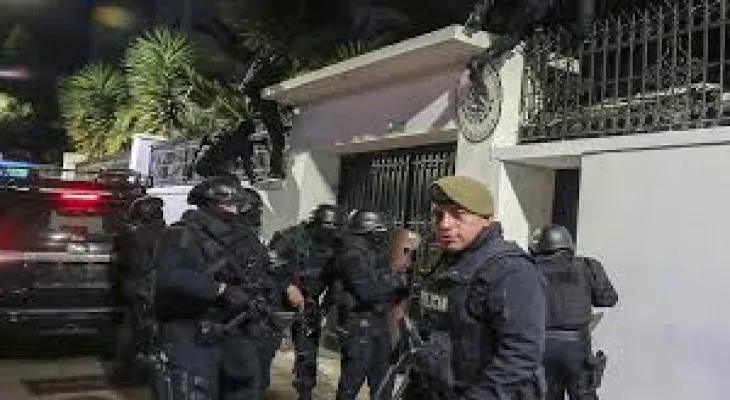Search here
Newspaper
Search here

Arab Canada News
News

Published: April 7, 2024
International leaders condemned Ecuador after police stormed the Mexican embassy in the country’s capital to arrest a former vice president who had been granted political asylum.
The late Friday raid prompted Mexican President Andrés Manuel López Obrador to sever diplomatic ties with Ecuador, while his government’s foreign minister said the move would be challenged before the international court in The Hague.
Police broke down the outer doors of the embassy in Quito to apprehend Jorge Glas, who had been residing there since December, having sought asylum after being accused of corruption and was granted refuge hours earlier.
The raid has been widely condemned.
The Organization of American States reminded its members, including Ecuador and Mexico, in a statement of their commitment not to "invoke local law rules to justify non-compliance with their international obligations."
Spain’s Ministry of Foreign Affairs said in a statement on Sunday that “the forced entry into the Mexican embassy in Quito constitutes a violation of the 1961 Vienna Convention on Diplomatic Relations.” We call for respect for international law and harmony between Mexico and Ecuador, the two countries brotherly to Spain and members of the Ibero-American community.”
U.S. State Department spokesman Matthew Miller said, “The United States condemns any violation of the Vienna Convention on Diplomatic Relations, takes seriously the host countries’ commitment under international law to respect the inviolability of diplomatic missions, and called on both countries to resolve their differences.”
Honduras President Xiomara Castro described the raid on X as "an unbearable act for the international community" and "a violation of the sovereignty of the Mexican state and international law" because it "ignores the historic and fundamental right to asylum."
Diplomatic premises are considered foreign soil and “inviolable” under the Vienna treaties, and law enforcement agencies in the host country are not allowed to enter without the ambassador’s permission. Asylum seekers live anywhere from days to years in embassies worldwide, including the Ecuadorian embassy in London, which sheltered WikiLeaks founder Julian Assange for seven years where British police could not enter to arrest him.
Mexican Foreign Minister Alicia Bárcena posted on social media platform X on Friday that a number of diplomats were injured during the raid.
Bárcena said Mexico will take the case to the International Court of Justice “to denounce Ecuador’s responsibility for violations of international law.” She also recalled Mexican diplomats.
Glas’s imprisonment
Glas was transferred on Saturday from the Prosecutor General’s Office in Quito to the coastal city of Guayaquil, where he will remain detained in a maximum-security prison. People gathered outside the Prosecutor General's Office cheered “Strength” as he left with a convoy of police and military vehicles.
Glas’s lawyer Sonia Vera told the Associated Press that officers stormed his room and he resisted when they tried to put his hands behind his back, and the officers “threw him to the ground, kicked him in his head, spine, legs, and arms,” and when “he was unable to walk, they dragged him out.”
Vera said the defense team was not allowed to speak with Glas while he was at the Prosecutor’s Office and is now working on filing a petition for a court hearing.
Authorities are investigating Glas over alleged violations during his management of reconstruction efforts following a powerful 2016 earthquake that killed hundreds of people, and he has been convicted on bribery and corruption charges in other cases.
Ecuador’s Foreign Minister Gabriela Somerveld told reporters on Saturday that the decision to enter the embassy was taken by President Daniel Noboa after considering the “imminent flight risk of Glas” and exhausting all diplomatic dialogue options with Mexico.
Mexico granted Glas asylum hours before the raid. Somerveld said, “It is not legal to grant asylum to people convicted of committing common crimes and wanted by competent courts.”
Noboa faces re-election
Noboa became Ecuador’s president last year amid the country’s struggle with unprecedented crime linked to drug trafficking. He announced in January that the country was in an “internal armed conflict,” classified 20 drug trafficking gangs as terrorist groups, and gave the military a mandate “to neutralize them” within the bounds of international humanitarian law.
Will Freeman, a Latin America studies fellow at the Council on Foreign Relations, said the decision to send police to the Mexican embassy raises concerns about the steps Noboa wants to take to seek re-election. His term ends in 2025; he was elected only to finish former President Guillermo Lasso’s term.
Freeman said, “I really hope Noboa does not shift more toward Bukele,” referring to El Salvador’s President Nayib Bukele, whose tough crime policies have faced harsh criticism from human rights organizations. “And that means less respect for the rule of law to boost his popularity before the elections.”
Freeman added that whether Glas abuses diplomatic protection is a “separate issue” from the decision to send police into the embassy.
He said, “We see a pattern of that in Latin America where politicians abuse embassies and foreign jurisdictions, not to evade prosecution but to escape accountability.”
The Mexican embassy in Quito remained heavily guarded by police after the raid, a boiling point of recent tensions between Mexico and Ecuador.
Vera, Glas’s lawyer, fears “something might happen” to him during detention given the record of detention facilities in the country, where hundreds have died in violent riots over the past few years. Among the deaths during detention are some suspects in the assassination of a presidential candidate last year.
Vera said, “In Ecuador, going to prison is tantamount to a death sentence.” “We consider the politician and international recognized person responsible for Jorge Glas’s life to be President Daniel Noboa Azin.”
Comments